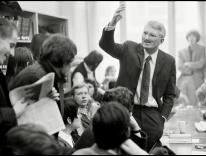When, at age nine, I made plans to become President of the United States, it was not out of any sense of the common good. It was to repair a hole in the political universe, namely the well-known law that “a Catholic cannot be elected president.” Ten years later, JFK beat me to it, and I disbanded my team of advisors and fundraisers.
Kennedy’s breakthrough was not the end of the surprises. In 1965, a pope actually landed on these shores, quite openly rather than by secret tunnel. In 1979 another pope was actually welcomed in the White House, by a Baptist president no less. After that pope-president tetes a tetes became routine.
The idea of a pope addressing a joint meeting of Congress, however, with Cabinet Secretaries and Supreme Court Justices and military commanders in attendance was something that would have entirely escaped my childhood imagination. But that was not all. Speaking in that hallowed chamber, the pope sang the praises of Dorothy Day and Thomas Merton. Truly beyond belief.
I wonder how many people in that chamber said, “Dorothy Who?” A great many surely said, “Thomas Who?” If it hadn’t been the pope speaking, they would probably have started googling.
We have to assume that Pope Francis knew what he was doing and not just relying on thin versions of Day’s and Merton’s lives that had filtered through in Spanish and Italian. Not that he really dwelt on the specifics of their lives. Like Lincoln and Dr. King, Francis used them more as rhetorical pegs for his own ideas than as full-blooded models. Still, unlike Lincoln and King, Day and Merton would not have passed muster with any team of speechwriters for an American president or presidential candidate. Both were genuine radicals who simultaneously loved America and made a point of being provocatively “un-American”—and who have long paper trails that anti-papal loudmouths can easily mine, if they haven’t started doing so already.
Of all the Catholic publications that came into my childhood home, two were required reading: the Catholic Worker and Commonweal. Day and Merton were presences, one way or another, in both, as well as in many books on the family shelves. The idea of Dorothy Day as a favorite saint of conservative bishops and donors continues to amuse me. Their counterparts in those Cold War days of Joe McCarthy and the House Un-American Activities Committee had a very different view: she was a shocking heretic to the Free World, anti-Communist creed. Merton, on the other hand, was not a heretic—who would say such a thing about a celebrity monk?—until, that is, he began making inflammatory statements about the U.S. and race and, all the worse, about the immorality of our nuclear weaponry.
Day was in the first rank of our family heroes, Merton a few ranks below. As an adolescent, I read The Seven-Storey Mountain with enthusiasm. As a graduate student I paced Merton’s Columbia campus. As an editorial assistant at Commonweal I met Merton (and Day) associates. As apprentice writers, my wife and I both published reviews in Jubilee, that proto-beatnik Catholic magazine that Merton friends had created. Part of growing up intellectually for me was learning how I could admire these two while strongly disagreeing with some of their ideas. With Day, that was easy; with Merton, more difficult. I took my distance from him, something I’ve been trying to remedy in this centennial year of his birth.
Beyond astonishment that an astonishing pope in his astonishing appearance in Congress should spotlight these two individuals, I take some comfort in the fact that both of them were writers. It isn’t as writers that they were brought forward, of course. But being writers was essential to how they came to live the lives they chose and how they lived them. Dorothy Day was a journalist by birthright, and the more I have reread and taught The Long Loneliness and many of her collected On Pilgrimage columns, the greater my appreciation of her writing. In renewing my acquaintance this year with the works of Merton, I came across a passage in which he declares that one constant in his life has always been to be a writer.
Maybe there is hope for some of us yet.
